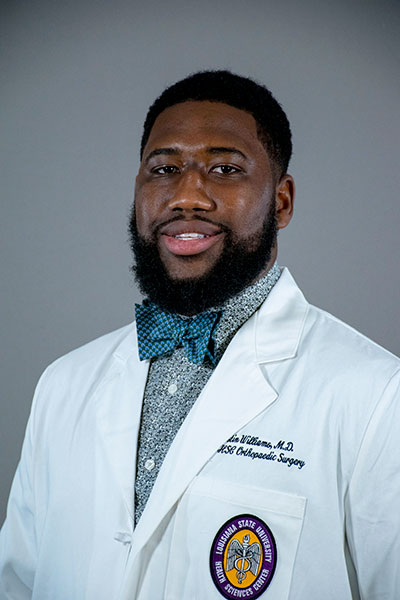Jestin Williams

Year
Graduated
Hometown
Nashville, Tennessee
What medical school did you attend?
Meharry Medical College
What undergraduate school did you attend? What did you study?
Alcorn State University - B.S. Biochemistry
What advice would you give to incoming residents?
Never give up on your dreams and always strive to be the best “you”, you can be in
any situation.
What originally attracted you to the LSU SOM Ortho Residency program?
The attendees, comradery of the residents, and diverse patient population attracted
me to the LSU Orthopaedic Residency. Attendees are dedicated to their craft and take a
hands-on approach to teaching, allowing residents to learn by walking through different
lessons or techniques step by step. The residents' function as one big family and
often hang out with each other. Everyone learns and helps one another grasp new concepts,
and the patient population you see is very diverse. This exposure enables residents
to gain insights to treat a multitude of patients.
What has been your favorite rotation so far and why?
The trauma rotation has been my favorite. Trauma volume is very heavy at the University
Medical Center (UMC), so you have to contribute significantly to help distribute the
work. This allows you to get your hands “dirty” early on, which is always fun. Running
around answering pages, seeing consults, operating all day could seem overwhelming
to some but to others it's just a great learning experience that I take full advantage
of.
What has proved the most challenging?
For the same reasons I enjoy it most, the trauma rotation has also proved the most
challenging. Because of the heavy influx of patients at the University Medical Center
(UMC), you are always busy either in the operating room, seeing consults, or managing
the floor. The constant work makes time management key during this rotation.
Is there ONE (rotation, or teacher, or situation or something) that will benefit you or your career for the better that you can share?
My first encounter with an LSU Orthopaedic attendee was with Dr. Marrero. He had come to my medical school to give a sawbones lecture, and I recall him exercising great patience as us young, eager medical students bombarded him with questions. Even after the lecture, he stayed hours over to further answer questions and even gave his personal contact information. During my time leading up to away rotations, I constantly reached out to him and he was very receptive, always giving great mentorship. His commitment to giving back and helping others is a quality I can only hope to emulate one day.
Resident Spotlight:
Nashville native Dr. Jestin Williams, a PGY-5 resident, was introduced to medicine early in life thanks to an injury…and his mother—a pediatrician. “Like many people, I found my way toward musculoskeletal medicine via a sports injury.”
But a broken thumb wasn’t going to stop Williams.
“I played multiple sports in high school and at one point broke my thumb. The doctor
said he could fix it, but I would be out for the remainder of the season. I played
for three-quarters of the season with a broken thumb, and then had surgery and had
it casted. It was around this time that because of my mom’s physician friends, I was
able to shadow orthopedic surgeons."
After attending Alcorn State University in Mississippi on a football scholarship,
Williams returned to Nashville for his M.D., matriculating at Meharry Medical College
in Nashville.
“During medical school I developed an interest in spine as well as oncology, so I
formulated a plan to do a fellowship in each one. The appeal of oncology is that you
get to operate all over the body; as for spine, the appeal was the ability to handle
degenerative
cases and trauma situations. Hips and knees are also in the mix as there are times
when a tumor has eroded through the bone, and you must remove the bone and essentially
do a hip or knee replacement.”
Already accepted into an oncology fellowship, Dr. Williams is now applying for a spine
fellowship. “I primarily want to be a spine oncologist rather than the other way around.
I have always enjoyed the more complex cases. I like challenging my fundamental skills
and knowledge in creating creative solutions to varied complex surgical tactics and
patient care. In the field of spine surgery, spine oncology has stood out for me as
an area that employs those challenges and fosters intricate thinking with uncommon
surgical techniques. In continuing my development into a spinal oncologist, next year
I will be starting the MD Anderson Musculoskeletal Oncology Fellowship to enhance
my medical and surgical knowledge of orthopaedic tumors.”
So how did he land at LSUHSC?
“I rotated here as a medical student, and I loved it because the camaraderie is far
better than other programs I have seen. I would say that it’s a bluecollar place that
holds a lot of academic prestige as well. All services are well represented here,
which is terrific because some programs don’t offer enough tumor or foot and ankle
experience. When I rotated here it was incredibly busy, but everyone remained upbeat
and did not let a hectic residency experience tear them down.”
And the lagniappe, says Dr. Williams, is the freedom residents are accorded.
“LSU is phenomenal in that residents are allowed to get early operative experience.
And the relationship with our attendings is unique because while they are professionals,
they are also very approachable. It’s the only place I know of that allows residents
to reach out to device reps. This is great training because in the real world you
have to interact with the reps.
So does he find anything difficult about the program?
“I think it’s hard to see so many patients in need. We see a lot of people who, for
whatever reason, have neglected wounds. On one occasion I have even seen maggots in
external fixators.
